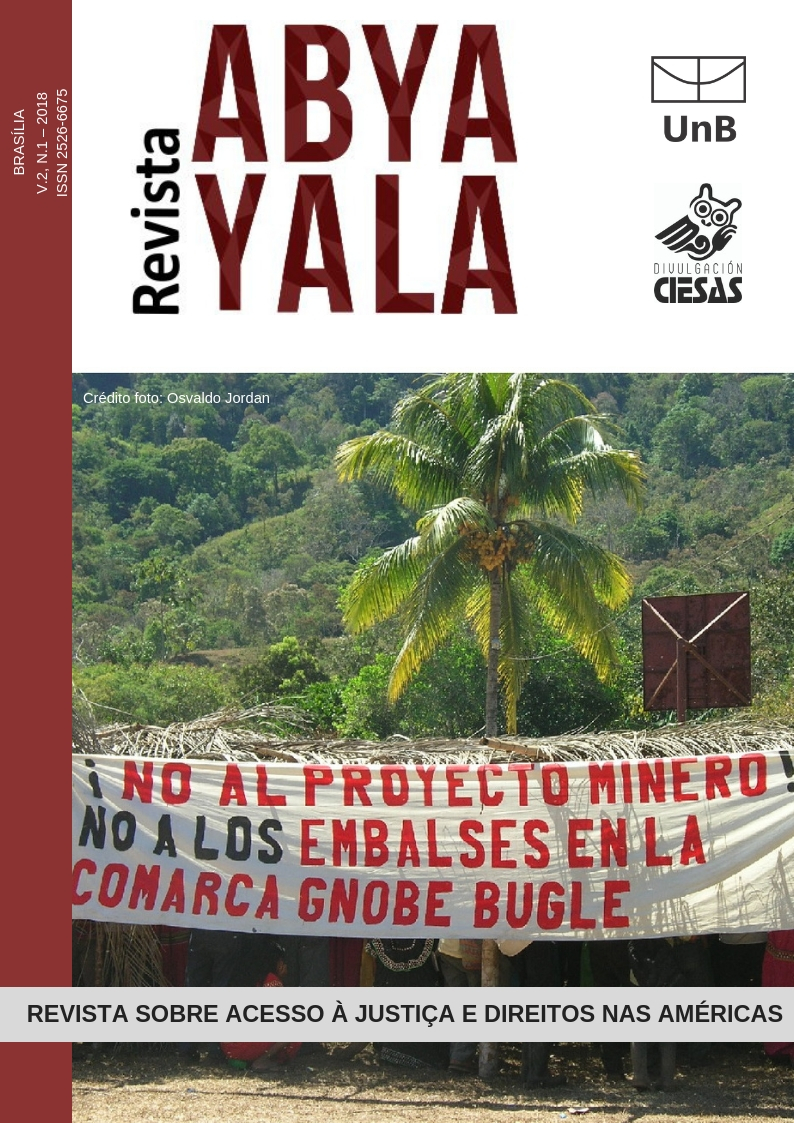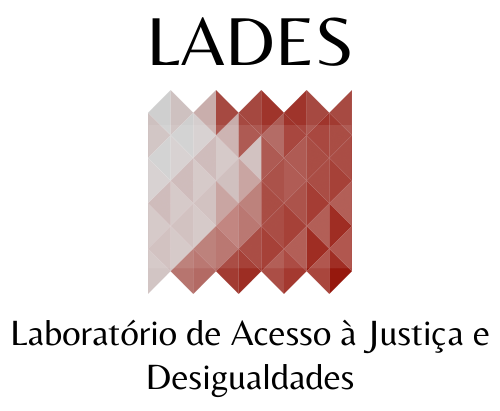The privatization of environmental discourse
clean development and indigenous territoriality in western Panama
DOI:
https://doi.org/10.26512/abyayala.v2i1.10699Palavras-chave:
desenvolvimento limpo, mercantilização da natureza, economia verde, territorialidade indígenaResumo
Facing the global ecological crisis, international organizations, national governments, financial institutions and private business have supported the idea of a green economy searching for win-win scenarios and public-private partnerships. Unfortunately, this perspective does not usually consider alternative conceptions of well-being, justice and happiness. The case of the Barro Blanco hydroelectric project in Western Panama warns against the underlying assumptions of the prevailing environmental discourse of sustainable development. Unless development projects start considering different opinions, ideals and expectations, there will be the possibility for protracted conflict and severe environmental damage as happened with the forceful flooding of Ngäbe communities in a hydroelectric reservoir linked with the Clean Development Mechanism (CDM) of the Kyoto Protocol. As negotiations continue for new market-based mechanisms to mitigate climate change, lessons should be learned from the Barro Blanco debacle to find new pathways that reduce greenhouse emissions and at the same time respect human rights and indigenous worldviews and territoriality.
Downloads
Referências
Alba, Manuel María. 1928. Etnología y Población Histórica de Panamá. Panamá, Imprenta Nacional. Brand, Ulrich. 2012. "Green economy”“the next oxymoron? No lessons learned from failures of implementing sustainable development." GAIA-Ecological Perspectives for Science and Society 21 (1): 28-32. Fairhead, James, Melissa Leach, and Ian Scoones. 2012. "Green Grabbing: a new appropriation of nature?" Journal of Peasant Studies 39 (2): 237-261.
Falla, Ricardo. 1979. El Indio y las Clases Sociales: El Indígena Panameño y la Lucha de Clases/Pista para la Intelección de los Grupos Étnicos. Centro de Capacitación Social.
Fox, Jonathan A. and L. David Brown (eds.). 1998. The Struggle for Accountability: World Bank, NGOs, and Grassroots Movements. Boston.
Gabb, William Moore. 1875. “On the Indian Tribes and Languages of Costa Rica”. Proceedings of the American Philosophical Society 14: 483-602.
Gjording, Chris. 1991. Conditions not of their Choosing: The Guaymi Indians and Mining Multinationals in Panama. Smithsonian Institution Press. Goodman, James, and Ariel Salleh. 2013. "The „green economy”Ÿ: class hegemony and counter-hegemony." Globalizations 10 (3): 411-424.
Guevara-Mann, Carlos. 1996. Panamanian Militarism: A Historical Interpretation. Ohio University Center for International Studies.
Guionneau-Sinclair, Francois. 1988. Movimiento Profético e Innovación Política entre los Ngobe (Guaymi) de Panamá, 1962-1984. Universidad de Panamá.
Hale, Charles. 2002. “Does Multiculturalism Menace? Governance, Cultural Rights and the Politics of Identity in Guatemala”. Journal of Latin American Studies 34: 485-542.
Harris, Reginald Gordon. 1926. Los Indios de Panamá. Panamá, Imprenta Nacional.
Heckadon-Moreno, Stanley. 1987. “Traducción y Notas, Los Indios Valiente de Bocas del Toro en 1817 según el Testimonio de Roberts” Revista Panameña de Antropología 3: 148-175.
Herrera, Francisco. 1989. “The State-Indian Relations in Panama, 1903-1983”. Master Thesis. University of Florida.
Jordan-Ramos, Osvaldo. 2010a. Indigenous Mobilization, Institutionalization and Resistance: The Ngobe Movement for Political Autonomy in Western Panama. Doctoral Dissertation. University of Florida, Gainesville.
b. ““Entré durante el día y salí por la noche”: Relaciones de Poder, Ambiente y Pueblos Indígenas en un Panamá Globalizado” In La Autonomía a Debate: Autogobierno Indígena y Estado Plurinacional en América Latina Miguel González, Araceli Burguete Cal y Mayor, y Pablo Ortíz (Coordinadores). FLACSO-GTZ-IWGIA-CIESAS-UNICH.
Keck, Margaret, and Kathryn Sikkink. 1998. Activists Beyond Borders: Advocacy Networks in International Politics. Cornell University Press.
Kothari, Ashish, Demaria, Federico, & Acosta, Acosta. 2014. “Buen Vivir, Degrowth and Ecological Swaraj: Alternatives to Sustainable Development and the Green Economy”. Development, 57(3-4), 362-375.
Lafeber, Walter. 1989. The Panama Canal: The Crisis in Historical Perspective. Oxford University Press. Lertzman, David A., and Harrie Vredenburg. 2005. "Indigenous peoples, resource extraction and sustainable development: An ethical approach." Journal of Business Ethics 56 (3): 239-254.
Lutz, Otto. 1924. Los Habitantes Primitivos de la República de Panamá. Leipzig, Imprenta de O. Brandstetter. Martínez-Alier, Joan, Leah Temper, Daniela Del Bene, and Arnim Scheidel. 2016. Is there a global environmental justice movement? The Journal of Peasant Studies Vol. 43 (3): 731-755. McAfee, Kathleen. 1999. "Selling nature to save it? Biodiversity and green developmentalism." Environment and planning D: society and space17 (2): 133-154.
Pearcy, Thomas. 1998. We answer only to God: Politics and the Military in Panama, 1903-1947. University of New Mexico Press.
Pinart, Alphonse. 1885. Chiriqui, Bocas del Toro, Valle Miranda. Paris. Societe de Geographie.
Pittier, Henry. 1912. “Little Known Parts of Panama” National Geographic Magazine 7.
Priestley, George. 1986. Military Government and Popular Participation in Panama: The Torrijos Regimes, 1968-1985. Westview Press. Prudham, Scott. 2009. "Pimping climate change: Richard Branson, global warming, and the performance of green capitalism." Environment and Planning A 41 (7): 1594-1613.
Ropp, Steve. 1982. Panamanian Politics: From Guarded Nation to National Guard. Hoover Institution Press.
Sarsanedas, Jorge. 1978. Tierra para el Guaymi. La Expoliacion de las Tierras Guaymies en Chiriqui. Centro de Capacitacion Social. Panama. Tienhaara, Kyla. 2014. "Varieties of green capitalism: economy and environment in the wake of the global financial crisis." Environmental Politics 23 (2): 187-204. Trouillot, Michel-Rolph. 2002. "The otherwise modern." Critically Modern: Alternatives, Alterities, Anthropologies. p. 220-237.
Van Cott, Donna Lee. 2005. From Movements to Parties in Latin America: The Evolution of Ethnic Politics. Cambridge University Press.
Velasquez-Runk, J. (2012). Indigenous land and environmental conflicts in Panama: neoliberal multiculturalism, changing legislation, and human rights. Journal of Latin American Geography, 11(2), 21-47.
Wanner, Thomas. 2015. "The new „Passive Revolution”Ÿof the green economy and growth discourse: Maintaining the „sustainable development”Ÿof neoliberal capitalism." New Political Economy 20 (1): 21-41
Yashar, Deborah. 2005. Contesting Citizenship in Latin America: The Rise of Indigenous Movements and the Postliberal Challenge. Cambridge University Press.
Young, Philip. 1976. “The Expression of Harmony and Discord in a Guaymi Ritual: The Symbolic Meaning of some Aspects of the Balseria” in Frontier Adaptations in Lower Central America Mary Helms and Franklin Loveland (eds.) Institute for the Study of Human Issues.
Ngawbe: Tradition and Change among the Western Guaymi of Panama. University of Illinois Press.
Downloads
Publicado
Como Citar
Edição
Seção
Licença
Copyright (c) 2018 Abya-yala: Revista sobre Acesso à Justiça e Direitos nas Américas

Este trabalho está licenciado sob uma licença Creative Commons Attribution-NonCommercial 4.0 International License.
O envio de contribuições para Abya Yala implica a cessão de direitos autorais e de publicação à Revista, observando a Atribuição-NãoComercial 4.0 Internacional (CC BY-NC 4.0) adotada.
O conteúdo dos textos submetidos à revista e por ela publicados serão de inteira responsabilidade de seus respectivos autores.
Copyright: https://creativecommons.org/licenses/by-nc/4.0/deed.pt_BR


 Este trabalho está licenciado como Atribuição Não Comercial 4.0 Internacional (CC BY-NC 4.0)
Este trabalho está licenciado como Atribuição Não Comercial 4.0 Internacional (CC BY-NC 4.0) 








